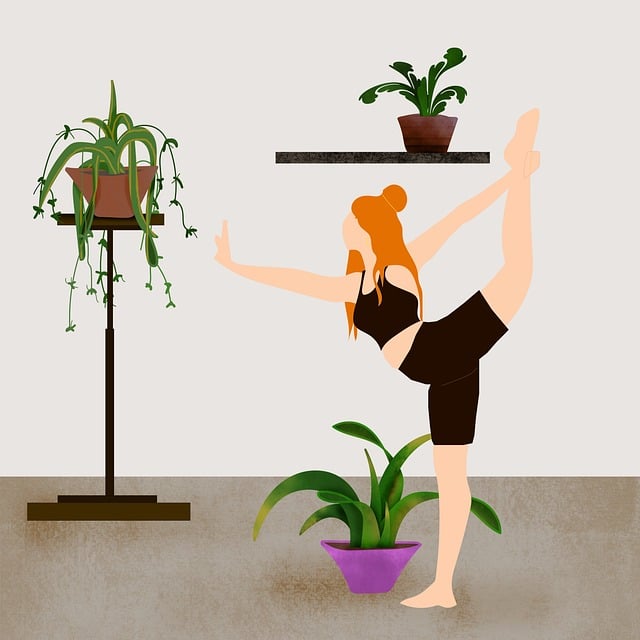Stress and anxiety, driven by modern life pressures, can be managed through holistic wellness practices. Mindfulness techniques like yoga and meditation, combined with healthy habits such as exercise, nutrition, breathing exercises, and gratitude journaling, significantly reduce stress levels. These integrated strategies enhance resilience, improve overall well-being, and enable individuals to better navigate life's challenges.
Stress and anxiety are prevalent in today’s fast-paced world, yet managing them is essential for our overall wellness. This article explores effective wellness practices aimed at calming the mind and body, focusing on simple yet powerful tools like mindfulness techniques, yoga exercises, meditation practices, and gratitude journaling. We’ll also delve into the benefits of deep breathing exercises, healthy eating habits, and regular physical activity as stress management strategies. By implementing these practices, you can cultivate resilience and find balance in your life.
- Understanding Stress and Anxiety: The Basis for Wellness Practices
- – Definition of stress and anxiety
- – Causes and symptoms
- – Impact on mental and physical health
Understanding Stress and Anxiety: The Basis for Wellness Practices

Stress and anxiety are prevalent issues that can significantly impact our overall well-being. They often stem from various sources, including work pressures, personal relationships, financial worries, or even everyday challenges. While occasional stress is a normal part of life, chronic or prolonged anxiety can lead to detrimental effects on both mental and physical health. This is where wellness practices step in as powerful tools for management and prevention.
Incorporating mindfulness techniques, such as yoga exercises and meditation practices, into daily routines can be transformative. These activities encourage individuals to focus on the present moment, cultivating a sense of calm and clarity. Additionally, stress management strategies extend beyond mental practices; healthy eating habits, regular physical activity, and even simple deep breathing exercises play crucial roles in reducing anxiety levels. Engaging in self-care routines, like gratitude journaling, allows individuals to reflect on positive aspects of life, fostering a more optimistic mindset. By combining these wellness practices, people can effectively navigate the challenges of modern living and cultivate long-term resilience against stress and anxiety.
– Definition of stress and anxiety

Stress and anxiety are prevalent issues in today’s fast-paced world, often stemming from a variety of factors including work pressures, personal relationships, financial constraints, and health worries. These feelings can significantly impact our overall wellness practices, causing both physical and mental exhaustion if left unaddressed.
Mindfulness techniques, such as yoga exercises and meditation practices, have gained recognition as effective stress management strategies. Incorporating these into daily routines can help individuals cultivate a sense of calm and present-moment awareness. Additionally, simple yet powerful tools like deep breathing exercises and gratitude journaling are accessible to everyone and can be seamlessly integrated into self-care routines. Healthy eating habits and regular physical activity also play a crucial role in managing stress and anxiety by promoting overall well-being and enhancing resilience.
– Causes and symptoms

Stress and anxiety are prevalent issues that can stem from a variety of factors. Causes may include demanding work or school schedules, financial pressures, relationship challenges, or even traumatic life events. Symptoms manifest in both physical and mental ways, including increased heart rate, muscle tension, restlessness, difficulty concentrating, and feelings of dread or panic. Integrating wellness practices such as mindfulness techniques, yoga exercises, and meditation practices can be powerful stress management strategies.
These holistic approaches promote a sense of calm and balance, helping to mitigate the impact of daily stressors. Additionally, adopting healthy eating habits, engaging in regular physical activity, and incorporating deep breathing exercises into your self-care routines can significantly contribute to overall well-being. Even simple practices like gratitude journaling can shift focus towards positive aspects of life, fostering a more resilient mindset.
– Impact on mental and physical health

Engaging in wellness practices like mindfulness techniques and yoga exercises can significantly mitigate the impact of stress and anxiety on both mental and physical health. Deep breathing exercises, a core component of many meditation practices, have been shown to lower heart rate and blood pressure, promoting relaxation and reducing the physiological effects of stress. Incorporating regular physical activity, healthy eating habits, and gratitude journaling into your self-care routines can further enhance these benefits.
Additionally, mindfulness and meditation practices encourage individuals to focus on the present moment, disrupting negative thought patterns that contribute to anxiety. Regular engagement in these wellness strategies not only helps manage stress and anxiety but also fosters a sense of calm and well-being, enabling individuals to navigate life’s challenges with greater resilience and clarity.
Incorporating wellness practices like mindfulness techniques, yoga exercises, and meditation practices into your daily routine can significantly mitigate the effects of stress and anxiety on both mental and physical health. Stress management strategies, coupled with healthy eating habits and regular physical activity, provide a holistic approach to well-being. Deep breathing exercises and gratitude journaling are effective tools that can be easily integrated into self-care routines, fostering a sense of calm and enhancing overall quality of life. By prioritizing these practices, individuals can navigate life’s challenges with greater resilience and clarity.
